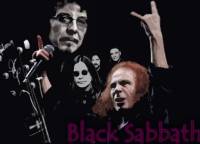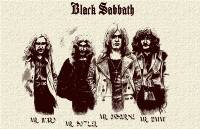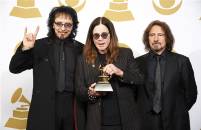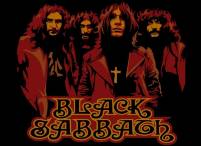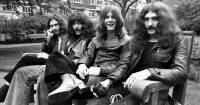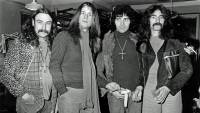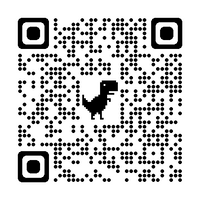This is the story about Black Sabbath, without Ronnie James Dio. For the Dio years you go to The Ronnie James Dio Story 4 Black Sabbath, and The Ronnie James Dio story 6 Heaven and Hell
Black Sabbath are an English Rock band, formed in Birmingham in 1968, by guitarist and main songwriter Tony Iommi, bassist and main lyricist Geezer Butler, singer Ozzy Osbourne, and drummer Bill Ward. The band have since experienced multiple line-up changes, with guitarist Tony Iommi being the only constant presence in the band through the years.
Originally formed as a Blues rock band, the group soon adopted the Black Sabbath moniker and began incorporating occult themes with horror-inspired lyrics and tuned-down guitars. Despite an association with these two themes, Black Sabbath also composed songs dealing with social instability, political corruption, the dangers of drug abuse and apocalyptic prophecies of the horrors of war.
Osbourne's regular abuse of alcohol and other drugs led to his dismissal from the band in 1979. He was replaced by former Rainbow vocalist, Ronnie James Dio. Following two albums with Dio, Black Sabbath endured countless personnel changes in the 1980s and 1990s that included vocalists Ian Gillan, Glenn Hughes, Ray Gillen and Tony Martin, as well as several drummers and bassists. In 1992, Iommi and Butler rejoined Dio and drummer Vinny Appice to record Dehumanizer. The original line-up reunited with Osbourne in 1997 and released a live album Reunion. Black Sabbath's 19th studio album, 13, which features all of the original members but Ward, was released in June 2013.
Black Sabbath are often cited as pioneers of Heavy metal music. The band helped define the genre with releases such as Black Sabbath (1970), Paranoid (1970) and Master of Reality (1971). They were ranked by MTV as the "Greatest Metal Band" of all time, and placed second in VH1's "100 Greatest Artists of Hard Rock" list. Rolling Stone magazine ranked them number 85 in their "100 Greatest Artists of All Time". They have sold over 70 million records worldwide. Black Sabbath were inducted into the UK Music Hall of Fame in 2005 and the Rock and Roll Hall of Fame in 2006. They have also won two Grammy Awards for Best Metal Performance.
Formation and early days (1968–1969)
Following the break-up of their previous band Mythology in 1968, guitarist Tony Iommi and drummer Bill Ward sought to form a heavy Blues rock band in Aston, Birmingham. They enlisted bassist Geezer Butler and vocalist Ozzy Osbourne, who had played together in a band called Rare Breed, Osbourne having placed an advertisement in a local music shop: "Ozzy Zig Needs Gig – has own PA". The new group was initially named the Polka Tulk Blues Band, the name taken either from a brand of talcum powder or an Indian/Pakistani clothing shop; the exact origin is confused. The Polka Tulk Blues Band featured slide guitarist Jimmy Phillips, a childhood friend of Osbourne's, and saxophonist Alan "Aker" Clarke. After shortening the name to Polka Tulk, the band again changed their name to Earth (which Osbourne hated) and continued as a four-piece without Phillips and Clarke. Iommi became concerned that Phillips and Clarke lacked the necessary dedication and were not taking the band seriously. Rather than asking them to leave, they instead decided to break up and then quietly reformed the band as a four-piece. While the band was performing under the Earth title, they recorded several demos written by Norman Haines such as "The Rebel", "Song for Jim", and "When I Came Down". The demo titled "Song for Jim" was in reference to Jim Simpson. Jim Simpson was a manager for the bands Bakerloo Blues Line and Tea & Symphony. Simpson was also a trumpet player for the group Locomotive. Simpson had recently opened a new pub named Henry's Blues House and offered to let Earth play some gigs in his club. The audience response was positive and Simpson agreed to manage Earth.
In December 1968, Iommi abruptly left Earth to join Jethro Tull. Although his stint with the band would be short-lived, Iommi made an appearance with Jethro Tull on The Rolling Stones Rock and Roll Circus TV show. Unsatisfied with the direction of Jethro Tull, Iommi returned to Earth in January 1969. "It just wasn't right, so I left", Iommi said. "At first I thought Tull were great, but I didn't much go for having a leader in the band, which was Ian Anderson's way. When I came back from Tull, I came back with a new attitude altogether. They taught me that to get on, you got to work for it."
While playing shows in England in 1969, the band discovered they were being mistaken for another English group named Earth. They decided to change their name again. A cinema across the street from the band's rehearsal room was showing the 1963 horror film Black Sabbath starring Boris Karloff and directed by Mario Bava. While watching people line up to see the film, Butler noted that it was "strange that people spend so much money to see scary movies." Following that, Osbourne and Butler wrote the lyrics for a song called "Black Sabbath", which was inspired by the work of horror and adventure-story writer Dennis Wheatley, along with a vision that Butler had of a black silhouetted figure standing at the foot of his bed. Making use of the musical tritone, also known as "the Devil's Interval", the song's ominous sound and dark lyrics pushed the band in a darker direction, a stark contrast to the popular music of the late 1960s, which was dominated by flower power, folk music, and hippie culture. Judas Priest frontman Rob Halford has called the track "probably the most evil song ever written". Inspired by the new sound, the band changed their name to Black Sabbath in August 1969, and made the decision to focus on writing similar material, in an attempt to create the musical equivalent of horror films.
Black Sabbath and Paranoid (1970–1971)
The band's first show as Black Sabbath took place on 30 August 1969, in Workington. They were signed to Philips Records in November 1969, and released their first single, "Evil Woman" (a cover of a song by the band Crow), recorded at Trident Studios, through Philips subsidiary Fontana Records in January 1970. Later releases were handled by Philips' newly formed Progressive rock label, Vertigo Records.
Black Sabbath's first major exposure came when the band appeared on John Peel's Top Gear radio show in 1969, performing "Black Sabbath", "N.I.B.", "Behind the Wall of Sleep", and "Sleeping Village" to a national audience in Great Britain shortly before recording of their first album commenced. Although the "Evil Woman" single failed to chart, the band were afforded two days of studio time in November to record their debut album with producer Rodger Bain. Iommi recalls recording live: "We thought 'We have two days to do it and one of the days is mixing.' So we played live. Ozzy was singing at the same time, we just put him in a separate booth and off we went. We never had a second run of most of the stuff."
Black Sabbath was released on Friday the 13th, February 1970, and reached number 8 in the UK Albums Chart. Following its US and Canadian release in May 1970 by Warner Bros. Records, the album reached number 23 on the Billboard 200, where it remained for over a year. The album was a commercial success but was widely panned by some critics. Lester Bangs dismissed it in a Rolling Stone review as "discordant jams with bass and guitar reeling like velocitised speedfreaks all over each other's musical perimeters, yet never quite finding synch". It sold in substantial numbers despite being panned, giving the band their first mainstream exposure. It has since been certified platinum in both US by the Recording Industry Association of America (RIAA) and in the UK by British Phonographic Industry (BPI).
To capitalise on their chart success in the US, the band returned to the studio in June 1970, just four months after Black Sabbath was released. The new album was initially set to be named War Pigs after the song "War Pigs", which was critical of the Vietnam War; however, Warner changed the title of the album to Paranoid. The album's lead-off single, "Paranoid", was written in the studio at the last minute. Ward explains: "We didn't have enough songs for the album, and Tony just played the [Paranoid] guitar lick and that was it. It took twenty, twenty-five minutes from top to bottom." The single was released in September 1970 and reached number four on the UK charts, remaining Black Sabbath's only top ten hit. The album followed in the UK in October 1970, where, pushed by the success of the "Paranoid" single, it made number one in the charts.
The US release was held off until January 1971, as the Black Sabbath album was still on the charts at the time of Paranoid's UK release. Black Sabbath subsequently toured America for the first time and played their first US show at a club called Ungano's at 210 West 70th Street in New York City. The album reached No. 12 in the US in March 1971, and would go on to sell four million copies in the US, with virtually no radio airplay. Like Black Sabbath, the album was panned by rock critics of the era, but modern-day reviewers such as AllMusic's Steve Huey cite Paranoid as "one of the greatest and most influential heavy metal albums of all time", which "defined the sound and style of Heavy metal more than any other record in rock history". The album was ranked at No. 131 on Rolling Stone magazine's list of The 500 Greatest Albums of All Time. Paranoid's chart success allowed the band to tour the US for the first time in October 1970, which spawned the release of the album's second single "Iron Man". Although the single failed to reach the top 40, "Iron Man" remains one of Black Sabbath's most popular songs, as well as the band's highest charting US single until 1998's "Psycho Man".
Master of Reality and Volume 4 (1971–1973)
In February 1971, after a one off performance at the Myponga Pop Festival in Australia, Black Sabbath returned to the studio to begin work on their third album. Following the chart success of Paranoid, the band were afforded more studio time, along with a "briefcase full of cash" to buy drugs. "We were getting into coke, big time", Ward explained. "Uppers, downers, Quaaludes, whatever you like. It got to the stage where you come up with ideas and forget them, because you were just so out of it."
Production completed in April 1971, in July the band released Master of Reality, just six months after the US release of Paranoid. The album reached the top ten in both the US and UK, and was certified gold in less than two months, eventually receiving platinum certification in the 1980s and Double Platinum in the early 21st century. Master of Reality contained Black Sabbath's first acoustic songs, alongside fan favourites such as "Children of the Grave" and "Sweet Leaf". Critical response of the era was generally unfavourable, with Lester Bangs delivering an ambivalent review of Master of Reality in Rolling Stone, describing the closing song "Children of the Grave" as "naïve, simplistic, repetitive, absolute doggerel – but in the tradition [of rock'n'roll] ... The only criterion is excitement, and Black Sabbath's got it". In 2003, Rolling Stone would place the album at number 300 on their 500 Greatest Albums of All Time list.
Following the Master of Reality world tour in 1972, Black Sabbath took its first break in three years. As Bill Ward explained: "The band started to become very fatigued and very tired. We'd been on the road non-stop, year in and year out, constantly touring and recording. I think Master of Reality was kind of like the end of an era, the first three albums, and we decided to take our time with the next album."
In June 1972, the band reconvened in Los Angeles to begin work on their next album at the Record Plant. The recording process was plagued with problems, many as a result of substance abuse issues. While struggling to record the song "Cornucopia" after "sitting in the middle of the room, just doing drugs", Ward was nearly fired from the band. "I hated the song, there were some patterns that were just ... horrible" Ward said. "I nailed it in the end, but the reaction I got was the cold shoulder from everybody. It was like 'Well, just go home, you're not being of any use right now.' I felt like I'd blown it, I was about to get fired". The album was originally titled Snowblind after the song of the same name, which deals with cocaine abuse. The record company changed the title at the last minute to Black Sabbath Vol. 4, with Ward stating "There was no Volume 1, 2 or 3, so it's a pretty stupid title really".
Black Sabbath Vol. 4 was released in September 1972, and while critics were dismissive of the album upon release, it achieved gold status in less than a month, and was the band's fourth consecutive release to sell a million copies in the US. With more time in the studio, the album saw the band starting to experiment with new textures, such as strings, piano, orchestration and multi-part songs. The song "Tomorrow's Dream" was released as a single – the band's first since "Paranoid" – but failed to chart. Following an extensive tour of the US, in 1973 the band travelled again to Australia, followed by a tour for the first time to New Zealand, before moving onto mainland Europe. "The band were definitely in their heyday," recalled Ward, "in the sense that nobody had burnt out quite yet."
Albums
Members
Former members
Black Sabbath (1970)
Paranoid (1970)
Master of Reality (1971)
Vol. 4 (1972)
Sabbath Bloody Sabbath (1973)
Sabotage (1975)
Technical Ecstasy (1976)
Never Say Die! (1978)
Born Again (1983)
Seventh Star (1986)
The Eternal Idol (1987)
Headless Cross (1989)
Tyr (1990)
Cross Purposes (1994)
Forbidden (1995)
13 (2013)
Tony Iommi – lead guitar (1968–present)
Geezer Butler – bass guitar (1968–1979, 1980–1985, 1987, 1990–1994, 1997–present)
Ozzy Osbourne – lead vocals (1968–1977, 1978–1979, 1985, 1997–present)
Touring members
Adam Wakeman – keyboards, back-up guitar (2004–2006, 2012–present)
Tommy Clufetos – drums (2012–present)
Bill Ward 1968–1980, 1982–1983, 1984–1985, 1994, 1995–1998, 1998–2012 (drums percussion backing vocals)
Dave Walker 1977–1978 (vocals)
Geoff Nicholls 1979–2004 (died 2017)
Ronnie James Dio 1979–1982,1991–1992, (2006-2010 as Heaven & Hell) (t 2010) (Vocals)
Craig Gruber 1979 (bass)
Vinny Appice 1980–1982, 1991–1993, 1998, (2006-2010 as Heaven & Hell) (drums)
Ian Gillan 1982–1984 (vocals)
Bev Bevan 1983-1984, 1987 (drums, percussion)
Ron Keel 1984 (vocals)
David Donato 1984–1985 (vocals)
Eric Singer 1985–1987 (drums)
Dave Spitz 1985-1986, 1987 (bass)
Glenn Hughes 1985–1986 (2010 as Heaven & Hell) (vocals)
Ray Gillen 1986–1987 (t 1993) (vocals)
Bob Daisley 1986 (bass)
Tony Martin 1987–1991, 1993–1997 (vocals)
Terry Chimes 1987 (drums)
Jo Burt 1987 (drums)
Cozy Powell 1988–1991, 1994–1995 (t 1998) (drums)
Laurence Cottle 1988–1989 (bass)
Neil Murray 1989–1991, 1994–1995 (bass)
Bobby Rondinelli 1993–1994, 1995 (drums)
